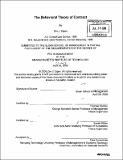The behavioral theory of contract
Author(s)
Eigen, Zev J. (Zev Jacob)
DownloadFull printable version (47.23Mb)
Other Contributors
Sloan School of Management.
Advisor
Thomas Kochan and Susan Silbey.
Terms of use
Metadata
Show full item recordAbstract
This work develops a theory of contract grounded in empirical analysis of individuals' experience with and interpretations of form-adhesive contracts. Form-adhesive contracts are unilaterally drafted, typically by organizations, intended for multiple signers. They are offered on a take-it-or-leave-it basis, with no opportunity afforded to negotiate in the traditional sense during the pre-agreement phase. This type of contract dominates the way in which exchange relationships between organizations and individuals are governed in many areas of contemporary life-including, but not limited to, employment, medical treatment, intellectual property licensure, telecommunications, and social networking. The theory poses the question, "how do individuals experience and interpret these agreements?" and explores the relationship between the answer on one hand, and two other elements on the other: (1) socio-economic exchange between the drafting organizations and signers, and (2) trust in the rule of law. The first part of the dissertation explains the theory. The second part explores the theory's empirical basis in an employment relationship. Employees' interpretations of a mandatory-arbitration agreement they signed as a condition of their employment are compared to MBA students' interpretations of the enforceability of a similar clause. MBA students with considerably greater educational attainment and employment opportunities are found to be significantly more likely to believe that they could escape the contract's terms to which they consented than employees of a large, national electronics retailer with consistently less education and fewer job opportunities. For both MBAs and employees, regarding the signed agreement as unenforceable is correlated with a greater likelihood of viewing the employment relationship as one devoid of trust or loyalty. In the third part, a large-scale web experiment is used to measure the behavior of signers of a form-adhesive contract. Both pre-agreement conditions varying the adhesiveness of the contract and post-agreement prompts (legal, moral, social and instrumental) urging signers to continue to perform as the contract purportedly requires are tested as competing determinants of contract performance. Results suggest that when subjects see and choose the contract term during the pre-agreement consent phase, they are more likely to perform as that term purportedly requires in the postagreement performance phase, and that prompting contractual performance based on an appeal to morality generates the greatest rate of performance. Consistent with the behavioral theory advanced in this research, a legal threat is associated with a level of contractual performance no better than a control condition in which subjects were requested to perform the same task, except without signing any contract requiring performance of that task.
Description
Thesis (Ph. D.)--Massachusetts Institute of Technology, Sloan School of Management, 2009. Includes bibliographical references (leaves [162]-174).
Date issued
2009Department
Sloan School of ManagementPublisher
Massachusetts Institute of Technology
Keywords
Sloan School of Management.